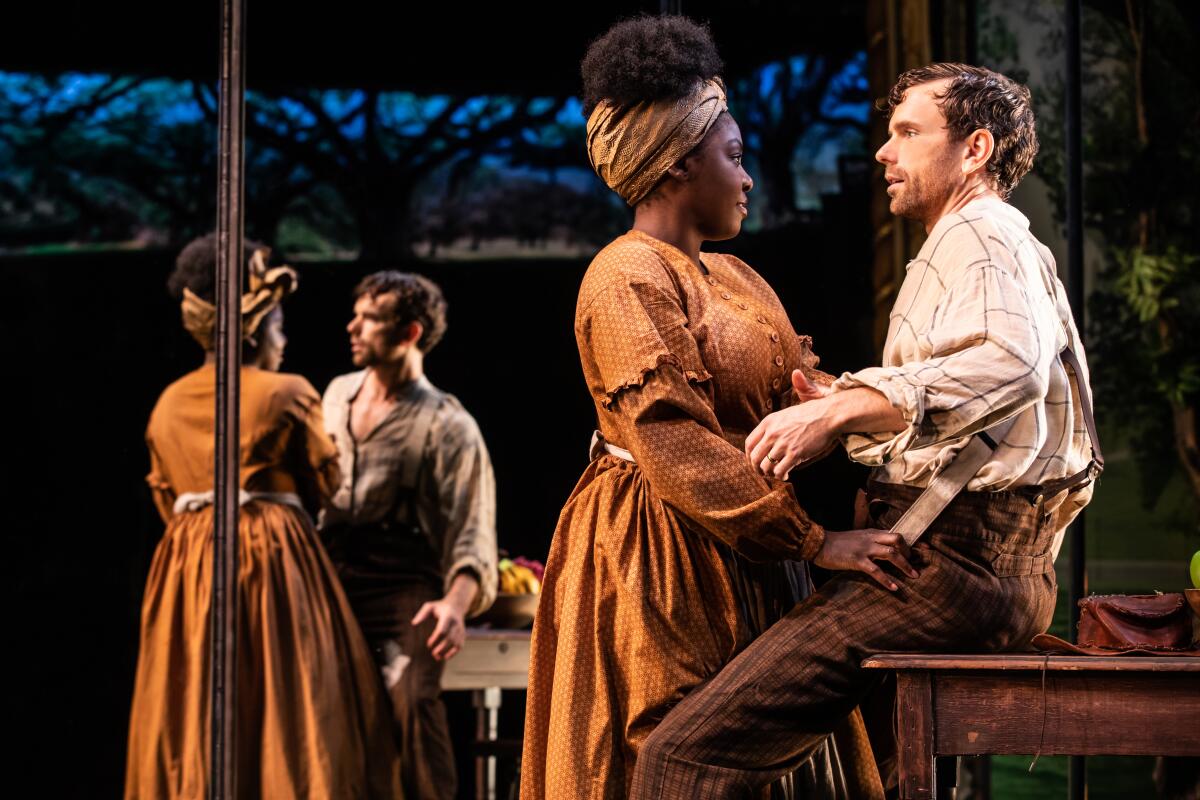Center Theatre Group makes a big promise to women and BIPOC playwrights

- Share via
Responding to a torrent of criticism about gender inequality and the potential loss of the acclaimed “Slave Play” as the centerpiece drama of the upcoming season, Center Theatre Group on Tuesday night committed to programming the entire 2022-23 season of the Mark Taper Forum with plays written by women-identifying or nonbinary playwrights, the majority of whom would be BIPOC artists.
The move came after mounting complaints that the Taper’s 2021-22 season included work by only one female writer. The anger over gender inequality culminated in playwright Jeremy O. Harris threatening to pull his “Slave Play,” which garnered 12 Tony nominations.
Shortly after Center Theatre Group released its letter on Facebook, Harris announced his decision on Twitter to allow “Slave Play” to remain in the Taper lineup. “So after 1½ weeks of Zooms and phone calls [with] artistic staff at @CTGLA as well as my team on ‘Slave Play,’ L.A. community members, multiple female mentors,” Harris wrote, “I’m excited to say that @SlavePlayBway will stay on the season for 2022. This came after multiple commitments listed below.”
Harris then linked out to an open letter signed by CTG’s associate artistic directors: playwright Luis Alfaro, Lindsay Allbaugh, Tyrone Davis, Neel Keller and Kelley Kirkpatrick. Artistic Director Michael Ritchie, who is scheduled to retire at the end of the year, was not a signatory, nor was Managing Director and Chief Executive Meghan Pressman. Pressman told The Times by email that the letter was signed by the associate artistic directors because the group is beginning “to pick up the leadership mantle for season planning and strategy as we start to look toward next season and time in transition between artistic leaders.”
Jeremy O. Harris threatens to pull ‘Slave Play’ from the Mark Taper Forum in solidarity with female playwrights noting the lack of representation.
The company also committed to anchoring the 2022-23 season at its Kirk Douglas Theatre in Culver City with a majority women-identifying or nonbinary and BIPOC playwrights. The smaller Kirk Douglas stage has traditionally been the place where female playwrights staged their work, while the more high-profile Taper has for years had a lineup dominated by men.
From the 2000-01 season through the 2022 slate of shows, 17 of 106 productions at the Taper, or 16%, have been written by women. During that time, eight seasons had no contributions from female writers; six seasons had just one woman in the lineup.
The upcoming season at the Taper will be the first after nearly two years of damaging pandemic shutdowns. CTG was forced to lay off more than half of its staff, while the murder of George Floyd sparked calls for meaningful change in American theater, including powerful demands for gender parity and racial inclusion.
Here is the CTG letter in its entirety:
To our artists, audience, colleagues, and partners,
We want to have a conversation with you.
We recently announced Center Theatre Group’s first Taper and Douglas seasons after a two-year Pandemic shutdown. We acknowledge that our 21/22 season was heavily imbalanced when it came to gender. Women-identified voices are needed on our stages in every season. As an organization that is actively working toward being anti-racist and inclusive, we take responsibility for the lack of intersectionality of social identities and experiences on our stages.
We have been reminded by our community this past week about the great need for transparency. We are an organization in the midst of pandemic recovery and at the start of an Artistic Leadership transition; this is a moment of great change and communication is incredibly important. The 22/23 season planning process began over a year ago, and we had already been working hard to make sure our programming was of the highest artistic caliber and has been informed by our commitment to center BIPOC voices and give more production slots to women-identifying and nonbinary playwrights.
As the season is shaping up, we are excited about our plan to schedule the full Taper 22/23 season next year with entirely women-identifying or non-binary playwrights and to also have it be a BIPOC-majority season. We are focusing our Douglas 22/23 season on majority women-identifying or nonbinary and BIPOC playwrights. We will continue our commitment to uplifting/building gender and racial equity within our production directors and artistic teams.
In addition to the work that will appear on our stages, our expanded New Play Development programs also further our commitment to gender and racial equity. We have been preparing to announce a new chapter for our Not a Moment, But a Movement initiative in which we will be commissioning six new plays by Black women-identifying or nonbinary playwrights. This adds to our other current developmental programs including the current writers cohort which is comprised of 10 women-identifying, majority BIPOC playwrights, and 11 of our 16 current commissions are with women-identifying playwrights, 11 are also BIPOC playwrights.
In the spirit of this commitment to transparency, we have shared these in-the-works plans with members of our community, including Jeremy O. Harris. Jeremy has faith in the necessary measures we are taking and as a result of these conversations, Slave Play remains the opening production of our upcoming Taper season.
Moving forward, a new Artistic Director(s) will program our future seasons. We are seeking leadership that shares our values and commitments to change.
We are grateful to the women-identified playwrights and other members of our community who made it clear that we need to better communicate our planning intentions. We look forward to continuing this conversation with you. We are unwavering in our commitment to cutting-edge art and diversity of all perspectives, and the best possible experience on our stages.
The Artistic Team can be reached at this email: [email protected].
Sincerely,
Luis Alfaro
Lindsay Allbaugh
Tyrone Davis
Neel Keller
Kelley Kirkpatrick
We acknowledge that terms and language like “women-identifying” and “nonbinary” are in a constant state of redefinition and evolution, and the language we use may change over time.
More to Read
The biggest entertainment stories
Get our big stories about Hollywood, film, television, music, arts, culture and more right in your inbox as soon as they publish.
You may occasionally receive promotional content from the Los Angeles Times.












